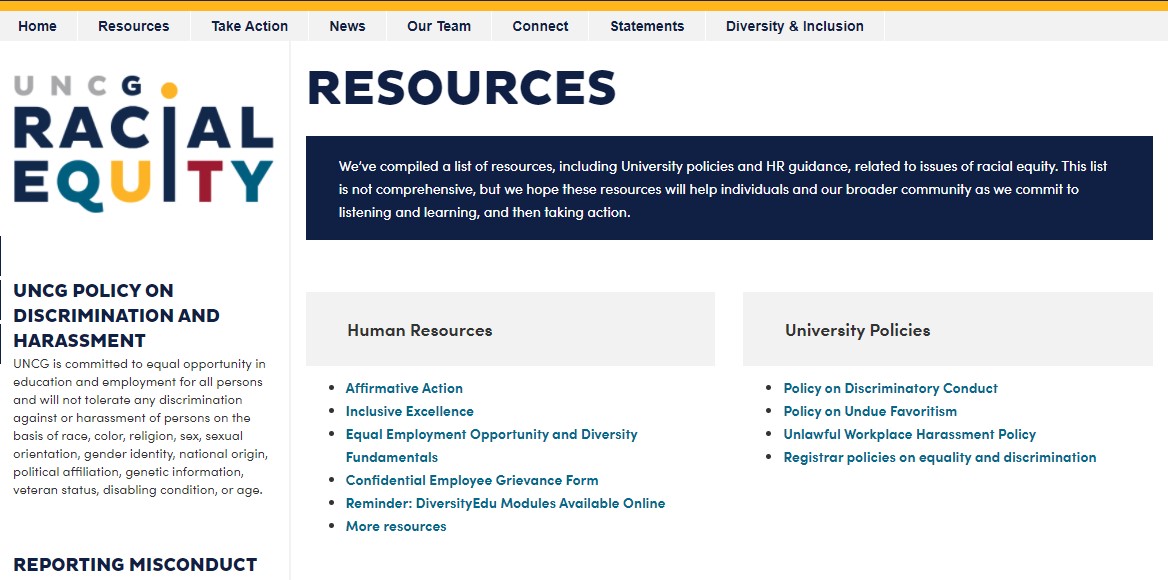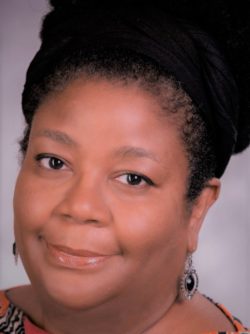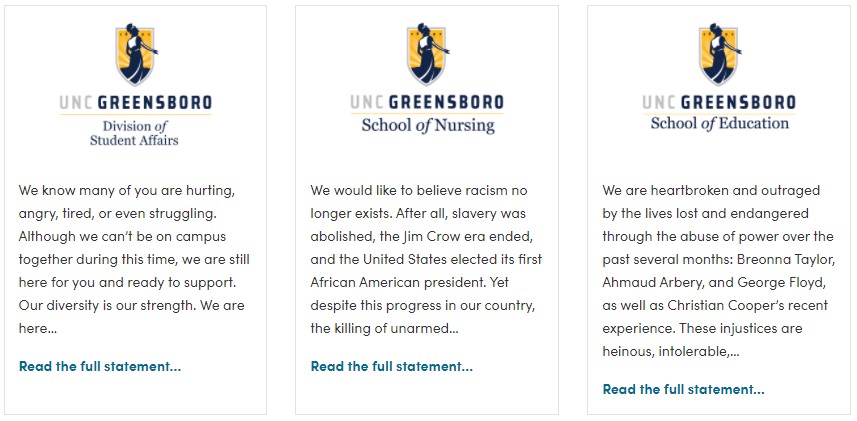“Our students needed it. Our community needed it. I think we needed it as a university community. How could we be silent?” – Dr. Andrea Hunter, Chancellor’s Fellow for Campus Climate, University of North Carolina Greensboro
The events that shaped 2020 – and the many that occurred long before the high-profile George Floyd murder, the Black Lives Matter movement and rallying cries for social justice – provided an opportunity for the University of North Carolina Greensboro to launch a groundbreaking website on racial equity.
But truth be told, UNC Greensboro has been leading the charge for many years to raise awareness about diversity and inclusion and close equity gaps. The website simply offered an opportunity at the right time to have a 24/7, “gathering space” to do it.
And it is a site to behold.
It contains scores of resources on race and racism to explore, powerful messages from campus and civic leaders and a special space for students and faculty to connect and have their voices heard. In addition, there are staple statements boldly displayed that address policies and ideals laid out by the university, including its stances on discrimination and harassment. All around one simple message: Racial Equity.
“I thought it was really important that we call it a racial equity website because of the discourse,” Hunter said. “And because if you don’t have the courage to name it, you will not have the courage to change it.”
Hunter and UNC Greensboro see the site as a place “where its community may ask difficult questions, seek out a community in dialogue to heal, and find resources to affirm the commitment to racial equity and systemic change.”

Connecting history, students and the generations
UNC Greensboro’s Racial Equity website is also a place to find a lot of information on a range of topics and links to connect the generations, from important historical figures to live events and from alumni to current students.

A few weeks ago, designers created a stunning home page that brought all of those audiences together with a Martin Luther King Jr. “takeover”. Featuring an audio clip from Dr. King’s famous “I Have a Dream” speech as well as commentary from Dr. Hunter to striking images of the civil rights leader, it was a celebration of his legacy and a preview of a virtual event held on Jan. 27 between UNCG, North Carolina A&T and Guilford College.
Currently, the site’s homepage displays one simple image – a painted stone with the words Black Lives Matter and a statement from Chancellor Franklin Gilliam Jr on “system inequities”, a reminder that the country has a long way to go to fix disparities that have existed for centuries.
“In terms of wanting to highlight MLK, it was intentional, not just because of his birthday and the national holiday, but I think it reminds us that it’s this moment to have the history,” Hunter says. “We need to get people to address Dr. King in some new ways. His legacy is unfinished. We haven’t gotten to that metaphorical ‘mountaintop’ he referenced the night before his assassination.”
For young students, those who may have studied the history of Dr. King and other leaders, the site is a living mechanism to keep the dialogue going, to give them context and understanding about the power in their words and to be able to continue their work.
“This is for young people in particular, who, unlike my generation, have come to know King’s work often in a very personal circumscribed way the whole idea that to change is continuous struggle, and that you’re a part of something larger, and that you can stand on those shoulders, on that foundation,” Hunter says.
“So often young people can feel disconnected from their historical past and understand its relevance. Each generation has this challenge that continues to come before them. I really wanted students and other young people to be able to connect to that intergenerational history and to see themselves a part of a long arc. And to understand that this is an evolutionary process of change. To give them inspiration, as well.”
What’s next on the horizon for the site?
“One of the things we were developing that would go beyond Black History Month is a focus on student activism past and present, and really trying to highlight the intergenerational nexus, and showcase that content between student activists who are elders now and student activists of this generation,” Hunter says.
What sets the site apart …

Beyond the messages and dialogue are myriad tools for students and for others to explore that are featured under several drop-down menus:
- Take Action, which features upcoming events to take part in
- Connect, which is simply a link to a form where students can help push more content, thoughts and ideas back to the site
- Diversity & Inclusion, which connects site users to the university’s separate equity, diversity and inclusion website
- News, which is a place not only for commentary, such as opinion on the attack on the U.S. Capitol, but also pertinent stories on racial equity and diversity
- And Resources, which is a portal that contains links to university policies, videos and podcasts and reading suggestions.
Perhaps the most striking element on the site is the commitment of university leaders and stakeholders to uphold diversity, equity and inclusion. A blanket statement from the university didn’t seem to be enough to get the true message across. UNCG wanted to hear individual voices and wanted to give them a special display space.
So, they create a dropdown called Statements that contains impactful and beautifully formatted letters from some of the top voices at UNC Greensboro after the Floyd murder. Beyond Chancellor’s Gilliam’s opening message are statements from the School of Health and Human Science, the Lloyd International Honors College, the Staff Senate, the Women’s soccer team and men’s basketball teams, the School of Music and so on. Many talk about the death and its impacts. All of them call for change.
“The unit statements, these are commitments that we’ve made that we should affirm,” Hunter says. “Words mean something. When you say you’re going to do something and commit yourself, that’s a promise that you’ve made to those who read.”
Most colleges and universities have portions of their sites dedicated to racial equity, a positive development that likely will continue to grow. At UNC Greensboro, Dr. Hunter and her team have gone above and beyond.
“This is so UNCG in a sense that it is so much more deeply personal and warm,” Hunter says. “There’s more engagement. It feels less institutional and sterile. I think that’s really important, that we can have a conversation as a community. It has a different feel to it, which I think reflects the best of UNCG around these issues.”





